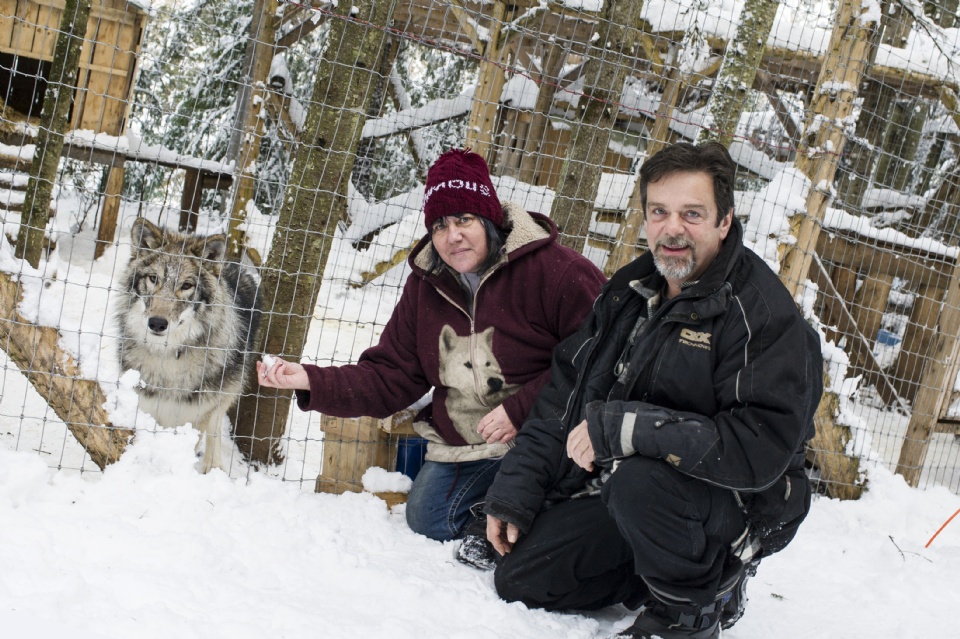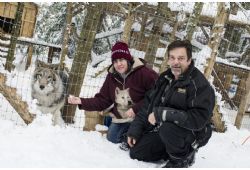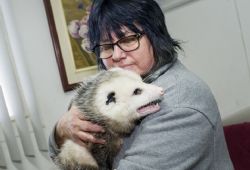The Centre-Refuge
Nymous is a centre for wildlife observation, rehabilitation and specialized
education. It also serves to provide a sanctuary for wild animals.
Nymous; The
Unforgettable History
Alone and
injured after losing his mother and siblings in a fatal accident, Nymous found
Jacques Lessard and Rachel Ouve. They took him in and nursed him back to
health. After living with Lessard and Ouve for just a short while, he quickly
became part of their family. He considered them his parents. Lessard and Ouve
taught him how to climb trees
and how to
fish, and Nymous tagged along with Lessard on ATV rides to the lake. Nymous
quickly became the star of the family – he even became known in France!
One day, a
photo of Nymous fell into the wrong hands and a complaint was made to the Ministère
de l'Énergie et des Ressources naturelles. By law, it is illegal to keep a
wild animal at home without a license. “At this point, Nymous was 22 months old
and he weighed 50 pounds. He was part of our family. It's like taking a child
away,” says Lessard. The Ministère de
l'Énergie et des Ressources naturelles decided to separate Nymous from
Lessard and Ouve. In his new home, Nymous no longer ate or drank. “He was letting himself
die,” says Lessard. He and Ouve travelled long distances to keep their raccoon
company and feed him. So they decided to fight for Nymous to return home. After
just a few weeks, Lessard and Ouve received a lot of media attention from media
outlets like Global News, Denis Levesque, TVA, and the Journal
de Québec, among others. They were able to collect more than 15,600
signatures for a petition to get Nymous back. While on set of the Denis
Levesque show in Quebec City, the Ministère de l'Énergie et des Ressources
naturelles granted Lessard and Ouve a license so Nymous could return home.
With Nymous
back home, Lessard and Ouve decided to open a wildlife observation centre. Soon
after, they were taking in orphaned baby raccoons. Because Nymous was very
protective of babies, Lessard and Ouve decided to sterilize him for safety
reasons. However, during the operation, Nymous contracted a virus that
developed into a fatal infection. At 26 months, Nymous died in the arms of
those who loved him the most in the world. “Nymous was a great animal. He
changed our lives,” explains Lessard.
An Important
Mission
The Centre-Refuge
Nymous has a mission to inform, educate and enable people to better
understand and
respect wildlife animals. “Too many animals suffer because humans fear what
they do not know,” explains Lessard. “We are the ambassadors of the raccoons.
An animal is simple. It has just three needs; food, housing and the need to
procreate. At the Centre-Refuge Nymous, they claim
the territory of wild animals and ensure people respect it.
They offer
services to educate people of all ages about Quebec wildlife and the
environment. “In my opinion, the Ministry of Education should incorporate an
educational component about the flora and fauna here in Quebec. Children must
be informed so they won’t have the same philosophy as their parents,” says
Lessard. The Centre-Refuge Nymous visits elementary schools, and makes
presentations in CEGEPs, universities, associations, companies, day camps,
trade shows, exhibitions and many more. “When it's possible, we go with an
animal. Children are fascinated,” says Lessard.
A Serious Need
The Centre-Refuge Nymous works between 130
and 140 hours a week to give back to wildlife animals. “It costs about $1,500
per month in groceries to feed all our animals. Yearly, veterinary fees can go
up to $15,000,” says Lessard. The shelter receives no help from the government.
“Animals belong to everyone, though,” Lessard explains.
Raccoons,
deer, cubs, fawns, coyotes, wolves, possums, foxes and skunks can also be found
at the Centre-Refuge Nymous. “We are the first line of defence,” Lessard
explains.
The wildlife
here are very well cared for. “The animals eat quality food. They enjoy a
balanced diet of almonds, walnuts, turkey, chicken, biscuits and cheese, among
others. They eat their fill. In winter, raccoons put on 30 per cent of their
weight and their hair grows a lot. It looks like little balls. They spend the
best years of their lives here, being kept away from humans, who are the cause
of their issues," explains Lessard. The Centre-Refuge Nymous also
receives a lot of help from volunteers. Some help with groceries and help to
feed babies.
People can
sponsor an animal for $25 a month. “An animal costs $900 to $1,000 a year to
meet all its needs. So you need three caregivers
per animal,” says Lessard. When someone sponsors an
animal, they receive a certificate of sponsorship confirming their contribution
to the survival of an animal in Quebec. The shelter also issues tax receipts
since it is a registered charity. The sponsor also receives photos and updates
about the animal. “Every animal has a name and a different story. We group them
by family,” Lessard explains.
A Devoted Spokesperson
Kim Bruneau is the spokesperson for the Centre-Refuge
Nymous. She found out about it when she was looking for a shelter for a
little orphaned raccoon, named Fleur. “When I was looking for a place for Fleur on
Facebook, several people recommended the Centre-Refuge Nymous. After
talking to Rachel Ouve on the phone for more than an hour, having checked the
facilities in pictures and reading all the recommendations, we went to visit
and were convinced that this was the best place for her,” says Bruneau.
It was Ouve’s
post on Facebook that convinced Bruneau to become the spokesperson for the
Centre-Refuge Nymous. “My cousin also decided to join the team by offering
her veterinary services, because it is extremely difficult to find
veterinarians
who want to treat wild animals and we need many,”
says Bruneau.
As the
spokesperson, Bruneau encourages people to donate and increases awareness about
the Centre-Refuge Nymous. “I am neither an extremist or an activist and
I do not tell people what they should do or not do. I talk to them about a
cause that is close to my heart and what I do to help. If this appeals to them,
I encourage them to get started. Anyway, I think anyone who goes to the centre
and meets Rachel, Jacques and the animals cannot help but fall in love with our
mission,” Bruneau says.
For more
information about the wildlife centre or to make a donation, visit centre-refuge-nymous.com.
Translated by Maria Barillaro

 In The Latest Issue:Latest Issue:
In The Latest Issue:Latest Issue:
- A Bittersweet Farewell
- The new Laval Aquatic Co...
- The End of an Era:
Articles
Calendar
Virtual- ANNUAL TEACHER APPRECIATION CONTEST
- APPUI LAVAL
- ARTS & CULTURE
- CAMPS
- CAR GUIDE
- CCIL
- CENTENNIAL ACADEMY
- CHARITY FUNDRAISING
- CITYTV
- COSMODÔME
- COMMUNITY CONNECTIONS
- COVER STORY
- DINA DIMITRATOS
- ÉCOLE SUPÉRIEURE DE BALLET DU QUÉBEC
- EDITORIALS
- ÉDUCALOI
- EDUCATION
- EMPLOYMENT & ENTREPRENEURSHIP
- FÊTE DE LA FAMILLE
- FÊTE DU QUARTIER SAINT-BRUNO
- FAMILIES
- FESTIVAL LAVAL LAUGHS
- FÊTE DE QUARTIER VAL-DES-BRISES
- FINANCES
- GLI CUMBARE
- GROUPE RENO-EXPERT
- HEALTH & WELL-BEING
- 30 MINUTE HIT
- ANXIETY
- CHILDREN`S HEALTH & WELLNESS
- CLOSE AID
- DENTAL WELLNESS
- EXTREME EVOLUTION SPORTS CENTRE
- FONDATION CITÉ DE LA SANTÉ
- GENERAL
- HEARING HEALTH
- MESSAGES FROM THE HEALTH AGENCY OF CANADA
- MENTAL HEALTH
- SEXUALITY
- SOCIAL INTEGRATION
- SPECIAL NEEDS
- TEENS
- THE NUTRITION CORNER
- THE NUTRITION CORNER - RECIPES
- VACATION DESTINATION
- WOMEN'S FITNESS
- WOMEN'S HEALTH
- HILTON MONTREAL/LAVAL
- HOME & GARDEN
- INTERNATIONAL WOMEN'S DAY
- JAGUAR LAVAL
- LAVAL À VÉLO
- LAVAL FAMILIES TV SHOW
- LAVAL FAMILIES MAGAZINE CARES
- LAVAL URBAN IN NATURE
- LE PARCOURS DES HÉROS
- LES PETITS GOURMETS DANS MA COUR
- LEON'S FURNITURE
- LEONARDO DA VINCI CENTRE
- LFM PREMIERES
- LIFE BALANCE
- M.P. PROFILE
- MISS EDGAR'S AND MISS CRAMP'S SCHOOL
- MISSING CHILDREN'S NETWORK
- NETFOLIE
- NORTH STAR ACADEMY LAVAL
- OUTFRONT MEDIA
- PASSION SOCCER
- PARC DE LA RIVIÈRE-DES-MILLE-ÎLES
- PÂTISSERIE ST-MARTIN
- PIZZERIA LÌOLÀ
- PLACE BELL
- PORTRAITS OF YOUR MNA'S
- ROCKET DE LAVAL
- SACRED HEART SCHOOL
- SCOTIA BANK
- SHERATON LAVAL HOTEL
- SOCIÉTÉ ALZHEIMER LAVAL
- STATION 55
- STL
- SUBARU DE LAVAL
- TECHNOLOGY
- TEDXLAVAL
- TODAY`S LAURENTIANS AND LANAUDIÈRE
- TODAY`S LAVAL
- WARNER MUSIC
- THIS ISSUE
- MOST RECENT
Magazine
A Place for Wildlife Animals
Articles ~e 105,7 Rythme FM 4 chemins Annual Teacher Appreciation Contest Appui Laval Arts & Culture Ballet Eddy Toussaint Camps THIS ISSUE MORE...
CONTESTS Enter our contests
CONTESTS Enter our contests
CALENDAR
Events & Activities
COMMUNITY Posts Events
PUBLICATIONS Our Magazine Family Resource Directory
LFM BUSINESS NETWORK Learn more
COUPONS Click to save!
COMMUNITY Posts Events
PUBLICATIONS Our Magazine Family Resource Directory
LFM BUSINESS NETWORK Learn more
COUPONS Click to save!
SUBSCRIPTIONS
Subscribe to the magazine
Un-Subscribe
E-NEWSLETTER Subscribe to our E-newsletter Un-Subscribe
WRITE FOR US Guidelines & Submissions
POLLS Vote today!
E-NEWSLETTER Subscribe to our E-newsletter Un-Subscribe
WRITE FOR US Guidelines & Submissions
POLLS Vote today!
ADVERTISERS
How to & Media guide
Pay your LFM invoice
SUGGESTIONS Reader's Survey Suggest a Listing
LFM About Us Our Mission Giving Back Contact Us
SUGGESTIONS Reader's Survey Suggest a Listing
LFM About Us Our Mission Giving Back Contact Us
 PICK-UP LOCATIONS
Get a copy of LFM!
PICK-UP LOCATIONS
Get a copy of LFM!
TERMS & CONDITIONS Privacy | Terms
ISSN (ONLINE) 2291-1677
ISSN (PRINT) 2291-1677
Website by ZENxDESIGN




 BY:
BY: 
Tweet
Share